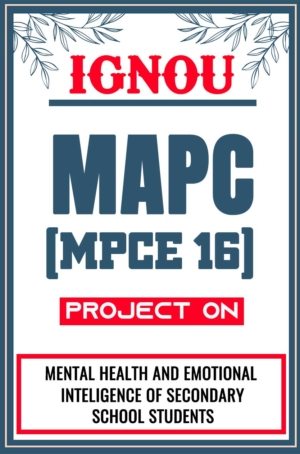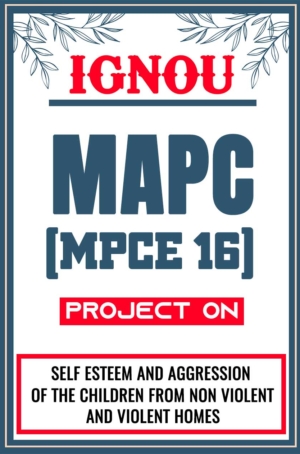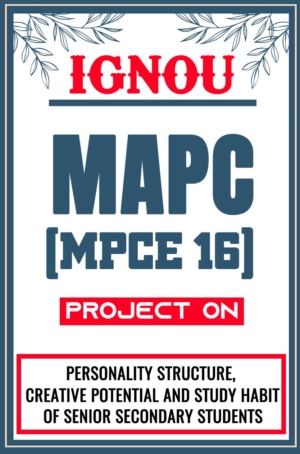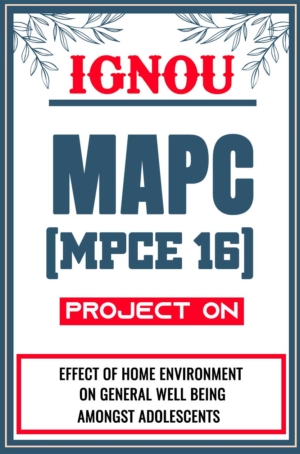Download IGNOU MPCE 16 Project for MAPC
IGNOU MPCE 16 Project i.e., IGNOU MA Clinical psychology project is as important to the nation’s health and well being as medical research. In the same way that medical scientists work to understand the prevention, genesis, and spread of various genetic and infectious diseases, scientists conduct rigorous psychological research studies to understand, prevent, and treat the human condition as it applies psychologically to individuals, couples, families, cultures, and diverse communities.
The course IGNOU MPCE 16 Project for MAPC offers students an engaging introduction to the essential topics in psychology. Throughout this study of human behavior and the mind, you will gain insight into the history of the field of psychology, as well as explore current theories and issues in areas such as cognition, motivation, and wellness. This course IGNOU MPCE 16 Project attracts many students because it not only deals with human and animal behavior but also increases self-awareness and logic among them. IGNOU MA PSYCHOLOGY PROJECT can be termed as both arts and science because its study is processed by scientific methods to study human behavior.
Whatsapp us to get the Personalized (Customized) IGNOU MPCE 16 Project Report and Synopsis for MAPC
What is the purpose of the IGNOU MPCE 16 Project?
The purpose of the MPCE 16 project for the Master of Arts in Psychology (MAPC) at IGNOU is to:
- Apply Theoretical Knowledge: It provides an opportunity for students to apply the theories and concepts learned throughout their coursework to practical research or real-world problems in psychology.
- Develop Research Skills: The project helps students develop essential research skills, including designing research studies, data collection, analysis, and interpretation.
- Contribute to the Field: Students have the chance to contribute to the field of psychology by exploring new research areas, addressing gaps in existing knowledge, or offering insights into practical issues.
- Enhance Critical Thinking: Engaging in a research project encourages critical thinking and problem-solving skills as students must analyze data, evaluate findings, and draw meaningful conclusions.
- Demonstrate Understanding: It allows students to demonstrate their comprehensive understanding of psychological concepts and their ability to conduct independent research.
- Prepare for Professional Practice: Completing the project prepares students for professional practice or further academic pursuits by providing hands-on experience in conducting research and presenting findings.
IGNOU MPCE 16 Project Topics examples for MAPC
- Academic Stress And Emotional Stability Among Obedient And Disobedient Students
- Study Of Depression And Suicidal Ideation Of Young And Middle Adulthood Women
- Occupational Stress, Job Burnout And Psychological Health Among Primary And High School Teachers
- Examination Anxiety In Relation To Self Esteem And Resilience Among Students
- Impact Of Social Media On Body Image, Self Esteem And Adjutment Level Of College Students
- A Study On Family Climate On Mental Health Of Students
- A Study Of Stress, Anxiety And Depression Among Nursing Students During Covid 19
What are the submission deadlines for the IGNOU MPCE 16 Project?
The submission deadlines for the MPCE 16 project in the IGNOU MAPC program can vary each academic session. Here’s how you can find the most accurate and up-to-date information:
- Check the Official IGNOU Website: Visit the IGNOU official website and look for the latest notifications or academic calendars which typically include deadlines for project submissions.
- Contact Your Study Center: Your study center or regional center will provide specific deadlines for project submissions. They can give you the exact dates and any other requirements.
- Refer to the Program Guide: Review the program guide or handbook provided for the MAPC course. It usually contains information about project deadlines and other important dates.
- Consult Your Supervisor: Your project supervisor or academic advisor may also provide guidance on submission deadlines and any updates that might not be officially published yet.
How do you formulate research questions or hypotheses for your IGNOU MPCE 16 Project?
Formulating research questions or hypotheses is a crucial step in the research process. Here’s a step-by-step guide to help you craft effective research questions or hypotheses for your MPCE 16 project:
Formulating Research Questions
Identify a Broad Topic:
- Start with a general area of interest within psychology that you want to explore. This could be a specific issue, phenomenon, or theory.
Conduct a Literature Review:
- Review existing research to understand what has already been studied, identify gaps in the literature, and refine your focus. This helps in formulating questions that are relevant and original.
Narrow Down the Focus:
- Break down the broad topic into more specific aspects. Consider what particular angle or aspect of the topic you want to investigate.
Define the Scope:
- Ensure your research questions are clear, focused, and manageable. They should be specific enough to guide your research but broad enough to allow for comprehensive exploration.
Formulate the Questions:
- Develop questions that are open-ended and researchable. They should address specific aspects of your topic and be framed in a way that allows for detailed investigation.
- Example: Instead of asking “What are the effects of stress?” you might ask “How does chronic stress impact cognitive performance in adults?”
Formulating Hypotheses
1. Start with a Research Question:
- Begin with a clear research question that your hypothesis will address. Your hypothesis is essentially a predictive statement about the relationship between variables.
2. Define Variables:
- Identify the independent variable (what you manipulate) and the dependent variable (what you measure). Ensure that your variables are clearly defined and measurable.
3. Construct the Hypothesis:
- Formulate a testable hypothesis that predicts a specific outcome or relationship between variables. It should be based on existing theory or preliminary data.
- Example: If your research question is “How does chronic stress impact cognitive performance in adults?” a possible hypothesis could be “Adults experiencing chronic stress will show lower scores on cognitive performance tests compared to those without chronic stress.”
4. Ensure Testability:
- Your hypothesis should be specific and operationalized so that it can be empirically tested through your research methods.
What should you do if you receive a poor grade on your IGNOU MPCE 16 Project?
Receiving a poor grade on your project can be disheartening, but there are constructive steps you can take to address the situation and improve:
Review Feedback
- Understand the Critique: Carefully review the feedback provided by the evaluator. Identify specific areas where your project was lacking or where improvements were needed.
- Seek Clarification: If any feedback is unclear, consult with your project supervisor or academic advisor for further explanation and guidance.
Reflect on Your Work
- Assess Your Approach: Reflect on your research process, methodology, and overall execution. Identify what went well and what could have been done differently.
- Consider Areas for Improvement: Determine if there were any gaps in your research, analysis, or presentation that contributed to the poor grade.
Consult Your Supervisor
- Discuss the Grade: Schedule a meeting with your project supervisor or mentor to discuss the grade and feedback. They can provide additional insights and help you understand where you went wrong.
- Get Recommendations: Ask for specific recommendations on how to improve and what changes could enhance your project or future work.
Revise Your Project (if applicable)
- Make Necessary Revisions: If allowed, revise your project based on the feedback received. Address the weaknesses and incorporate improvements as suggested.
- Resubmit (if possible): Check if there is an option to resubmit the revised project or if you can apply for a re-evaluation.
Learn from the Experience
- Develop Skills: Use the feedback to develop your research, writing, and analytical skills. Focus on improving areas where you faced challenges.
- Apply Lessons: Apply what you have learned to future projects or academic work to avoid similar issues.
Consider Additional Support
- Seek Academic Help: If you consistently struggle with similar issues, consider seeking additional academic support or tutoring to strengthen your skills.
- Join Study Groups: Collaborate with peers or join study groups to gain different perspectives and insights into your work.
Maintain a Positive Attitude
- Stay Motivated: A poor grade is an opportunity to learn and grow. Maintain a positive attitude and use the experience to enhance your academic and professional skills.
- Set New Goals: Set specific goals for improvement and work towards achieving them in future projects or coursework.
How do you prepare for the IGNOU MPCE 16 Project viva or presentation (if applicable)?
Preparing for a project viva or presentation is crucial for effectively communicating your research and defending your work. Here are some steps to help you prepare:
1. Understand the Format
- Review Guidelines: Check any specific guidelines or requirements provided by your institution for the viva or presentation.
- Know the Duration: Be aware of the allotted time for your presentation and Q&A session.
2. Organize Your Presentation
Create a Clear Outline: Structure your presentation to cover the key components of your project:
- Introduction: Briefly introduce your research topic, objectives, and significance.
- Literature Review: Summarize relevant literature and how it informed your research.
- Methodology: Explain your research design, methods, and data collection.
- Findings: Present your main results and analysis.
- Discussion: Discuss the implications of your findings and how they relate to existing research.
- Conclusion: Summarize key points and suggest potential future research.
- Design Slides: Prepare clear and concise slides to support your presentation. Use visuals such as charts, graphs, and images to illustrate key points.
3. Practice Your Presentation
- Rehearse: Practice delivering your presentation multiple times. Focus on clarity, timing, and smooth transitions between sections.
- Seek Feedback: Present to peers or mentors to get constructive feedback and make improvements.
- Time Yourself: Ensure that your presentation fits within the allotted time and allows for questions at the end.
4. Prepare for Questions
- Anticipate Questions: Think about potential questions that may be asked and prepare clear, concise answers. Common questions might relate to your research design, methodology, findings, and implications.
- Review Feedback: Consider any feedback you received on your project and be ready to address related questions.
5. Prepare Supporting Materials
- Handouts: Prepare handouts or supplementary materials if required or helpful.
- Backup: Bring backups of your presentation on a USB drive or cloud storage to avoid technical issues.
6. Day of the Presentation
- Dress Professionally: Wear appropriate attire to make a good impression.
- Arrive Early: Arrive at the venue early to set up your equipment and address any technical issues.
- Stay Calm and Confident: Take deep breaths, stay focused, and approach the presentation with confidence. Remember that you are the expert on your project.
7. During the Viva or Presentation
- Engage the Audience: Make eye contact, speak clearly, and engage with your audience. Be enthusiastic about your research.
- Handle Questions Professionally: Listen carefully to questions, answer them thoughtfully, and stay calm even if faced with challenging queries.
8. Post-Presentation
- Reflect: After the presentation, reflect on the feedback and questions you received. Consider how you can apply this feedback to improve your future work.
- Follow-Up: If there are any follow-up actions or additional information requested, make sure to address them promptly.
How do you handle sensitive topics or data in your IGNOU MPCE 16 Project?
Handling sensitive topics or data in your project requires careful consideration to ensure ethical standards and respect for participants. Here’s a comprehensive approach to managing sensitive topics or data:
Understand the Sensitivity
- Identify Sensitivity: Determine why the topic or data is sensitive. This could involve issues related to personal privacy, confidentiality, mental health, or vulnerable populations.
- Assess Risks: Consider the potential risks to participants if their data is exposed or misused.
Obtain Informed Consent
- Clear Explanation: Ensure participants fully understand the nature of the research, the use of their data, and any potential risks.
- Voluntary Participation: Participation should be voluntary, and participants should be able to withdraw at any time without penalty.
- Written Consent: Use written consent forms, detailing how data will be used, stored, and protected.
Ensure Confidentiality
- Anonymization: Remove or code personal identifiers from the data to prevent it from being traced back to individuals. Use pseudonyms or ID numbers instead of names.
- Secure Storage: Store sensitive data in secure locations. Use password protection and encryption if necessary, whether the data is in digital or physical form.
- Access Control: Limit access to sensitive data to only those who need it for research purposes.
Follow Ethical Guidelines
- Institutional Review Board (IRB) Approval: If applicable, obtain approval from an IRB or ethics committee before beginning your research.
- Adhere to Guidelines: Follow any specific ethical guidelines provided by your institution or professional organizations.
Handle Data Responsibly
- Data Management: Ensure that data collection, storage, and analysis methods adhere to ethical standards. Avoid sharing sensitive data without permission.
- Reporting Results: Present results in a way that does not disclose individual identities or sensitive details. Aggregate data when possible to protect privacy.
Be Sensitive in Your Approach
- Respect Participants: Approach sensitive topics with care and empathy. Avoid causing unnecessary distress or discomfort.
- Provide Support: Offer resources or support options for participants if discussing sensitive issues, such as counseling services if needed.
Addressing Sensitive Findings
- Consider Implications: Reflect on the implications of your findings, especially if they involve sensitive issues. Handle them with care in your analysis and reporting.
- Seek Guidance: Consult with your supervisor or ethical review board if you are unsure how to handle sensitive findings or if you encounter ethical dilemmas.
Maintain Transparency
- Research Integrity: Be honest and transparent about your research methods and how you handle sensitive data.
- Report Issues: If any ethical issues arise during the research, report them to the appropriate authorities or ethics committee.
Follow Data Disposal Guidelines
- Data Retention: Retain sensitive data only as long as necessary for the research. Follow institutional policies regarding data retention.
- Secure Disposal: Dispose of sensitive data securely when it is no longer needed, using methods that ensure complete destruction of the data.
Ready to get your IGNOU MPCE Project Report and Synopsis Sample PDF for MAPC?
- Call us or WhatsApp us at: 9958947060, 9354637830
- Visit: SHRICHAKRADHAR.COM
-
Sale!

-
Sale!

IGNOU MAPC (MPCE 16) Synopsis/Proposal & Project Report/Dissertation in Soft-Copy (Sample-2)
Original price was: ₹499.00.₹149.00Current price is: ₹149.00. -
Sale!

IGNOU MAPC (MPCE 16) Synopsis/Proposal & Project Report/Dissertation in Soft-Copy (Sample-3)
Original price was: ₹499.00.₹149.00Current price is: ₹149.00. -
Sale!

IGNOU MAPC Project (MPCE 16) Synopsis/Proposal & Project Report/Dissertation in Soft-Copy (Sample-4
Original price was: ₹499.00.₹149.00Current price is: ₹149.00. -
Sale!

IGNOU MAPC Project (MPCE 16) Synopsis/Proposal & Project Report/Dissertation in Soft-Copy (Sample-5)
Original price was: ₹499.00.₹149.00Current price is: ₹149.00. -
Sale!

IGNOU MAPC Project (MPCE 16) Synopsis/Proposal & Project Report/Dissertation in Soft-Copy (Sample-6)
Original price was: ₹499.00.₹149.00Current price is: ₹149.00. -
Sale!

IGNOU MAPC Project (MPCE 16) Synopsis/Proposal & Project Report/Dissertation in Soft-Copy (Sample-7)
Original price was: ₹499.00.₹149.00Current price is: ₹149.00. -
Sale!

IGNOU MAPC Project (MPCE 16) Synopsis/Proposal & Project Report/Dissertation in Soft-Copy (Sample-8)
Original price was: ₹499.00.₹149.00Current price is: ₹149.00. -
Sale!

IGNOU MAPC Project (MPCE 16) Synopsis/Proposal & Project Report/Dissertation in Soft-Copy (Sample-9)
Original price was: ₹499.00.₹149.00Current price is: ₹149.00. -
Sale!

IGNOU MAPC Project (MPCE 16) Synopsis/Proposal & Project Report/Dissertation in Soft-Copy (Sample-10)
Original price was: ₹499.00.₹149.00Current price is: ₹149.00.
